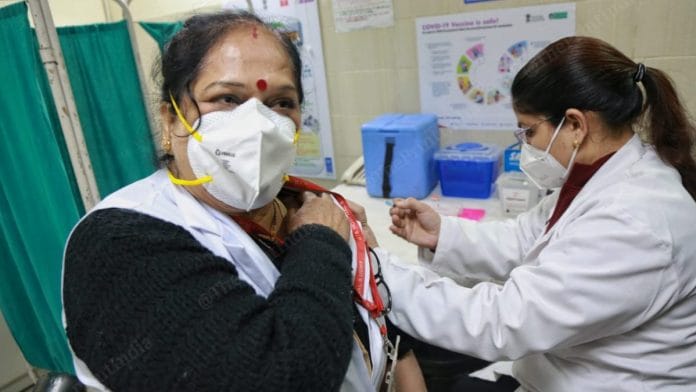New Delhi: As India prepares to roll out what Prime Minister Narendra Modi has called the world’s largest Covid-19 vaccination programme, the Covid Vaccine Intelligence Network (CoWIN) system is emerging as its backbone.
The initial target is to vaccinate 30 crore people, for which the first four target groups have already been identified and defined. For these groups, the vaccination process will start when they receive a message on their mobile phones — first about their inclusion in the list of priority beneficiaries, and subsequently, about the date and time of vaccination.
However, there will also soon be an option on the app, as and when it goes public, to self-register, along with the relevant identification and other documents. That is the eventual plan.
ThePrint brings you insight into this app and the registration process.
Also read: Strict follow-up, informed consent from recipients — conditions set for cleared Covid vaccines
About CoWIN
For several years now under its universal immunisation programme, India has been using a vaccine intelligence system called eVIN (electronic vaccine intelligence network), which provides real-time feedback of vaccine stocks, power outages, temperature fluctuations etc. CoWIN is essentially an extension of eVIN. It is a cloud-based IT solution for planning, implementation, monitoring, and evaluation of Covid-19 vaccination in India.
It has utilities for every level of user — from civil servants in national and state capitals to public health system managers, vaccinators and, at a later stage, potential beneficiaries.
According to the operational guidelines for Covid-19 vaccination prepared by the Ministry of Health: “The system allows for creation of users (admins, supervisors, vaccinators), registration of beneficiaries (bulk upload and individual registration), facilities/planning unit and session sites followed by planning and scheduling sessions and implementation of vaccination process.”
The guidelines add: “CoWIN system on a real time basis will track not only the beneficiaries but also the vaccines, at national, state and district level. This will allow the system to monitor the utilisation, wastage, coverage of Covid-19 vaccination at national, state, district and sub-district level.”
Every detail, from the sites where vaccinations are carried out to the number of beneficiaries and even the batch number, doses per vial and schedule of the vaccine, will be uploaded on the digital platform.
Initial registration only through districts
Once the complete list of healthcare workers and frontline workers is received — these are the first two priority groups for vaccination — their registration will be done through bulk upload of data by district authorities. Each facility that is a hospital or a clinic will also add the details of individuals working with them. The software will check for errors or duplications, and then allow upload of only the verified entries.
Vaccinators will then create session sites with the relevant details and the number of beneficiaries that will get the vaccines. This will generate SMSes that beneficiaries will get, informing them of the time and place. Once vaccination is done, the vaccinators will again upload that information. If a beneficiary fails to turn up, they can be slotted for a later date.
Self-registration will come later
The option of self-registration will be available only at a later date, once the initial groups have been completed. People willing to get vaccinated can register themselves by uploading any one of 12 identification documents. These are:
– Aadhaar card
– Driving licence
– Health insurance smart card issued under the scheme of Ministry of Labour
– MGNREGA job card
– Official identity card issued to MPs/MLAs/MLCs
– PAN card
– Passbook issued by bank/post office
– Passport
– Pension document
– Service identity card issued to employees by central/state govt/PSUs/public limited companies
– Smart card issued by Registrar General of India under National Population Register
– Voter ID card
A person will have three authentication options to choose from — biometric, OTP-based and authentication using date of birth etc. If the last is successful, a green tick will appear against the entry.
“Self-registration module will be made available in the later phases of implementation,” say the operational guidelines.
Also read: Everything you need to know about Covaxin, India’s controversial Covid vaccine candidate







This app asks ts required. Then loops inside. Non working app it is. This is an official joke to sr. Citizens.